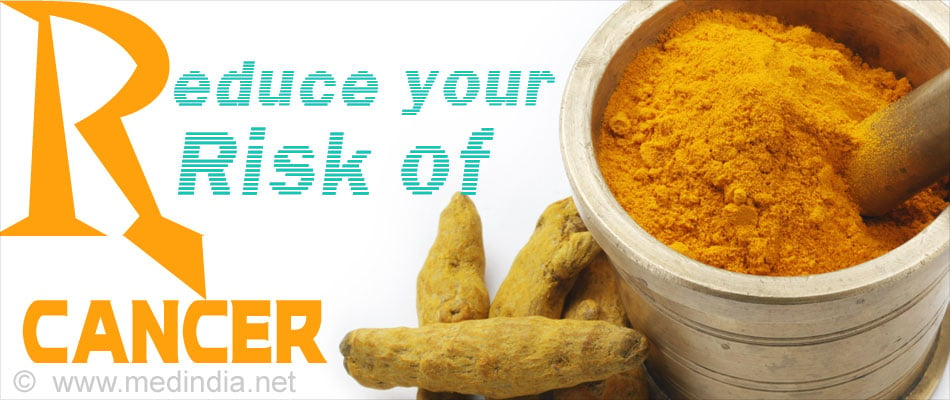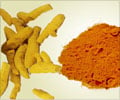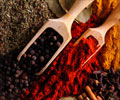What is Turmeric Powder?
Turmeric powder is a bright yellow powder made by dry grinding of mature turmeric rhizomes (underground stems). The use of turmeric for coloring and flavoring food, for cosmetic purposes and for medicinal properties dates back to the ancient Vedic culture of India.
Used in almost all Indian curries, this spice has almost no calories (1 tablespoon = 24 calories) and zero cholesterol. It is rich in dietary fiber, iron, potassium, magnesium and vitamin B6.
Health Benefits of Turmeric
The wide range of turmeric health benefits come mainly from its ingredient, curcumin. This widely researched component of turmeric is highly therapeutic and is used in various drugs and pharmaceutics mainly because of its immunity boosting and anti-oxidant properties.
Boosts Immunity: Curcumin has a huge therapeutic value and boosting immunity is one of the most important properties of curcumin.
"5 to 8 times stronger than vitamin E and stronger than vitamin C, this antioxidant breakthrough may help boost your immunity, maintain normal cholesterol levels, and put the brakes on aging," says Dr. Joseph Mercola about curcumin in turmeric.
His claims are well substantiated by various studies. For example, Jagetia and Aggarwal at the Department of Experimental Therapeutics, The University of Texas M. D. Anderson Cancer Center, Houston, USA, reported, "Interestingly, curcumin at low doses can also enhance antibody responses. This suggests that curcumin's reported beneficial effects in arthritis, allergy, asthma, atherosclerosis, heart disease, Alzheimer's disease, diabetes, and cancer could be due in part to its ability to modulate the immune system."

Has Anti-inflammatory and Anti-oxidant Properties: Free radical causing oxidative damage to DNA and proteins are associated with a variety of chronic diseases such as cancer, atherosclerosis, and neurodegenerative diseases. Curcumin plays an important role in curbing these conditions. Curcumin down-regulates certain inflammatory transcription factors such as kappaB, enzymes such as cyclooxygenase 2 and 5 lipoxygenase, and cytokines such as tumor necrosis factor (TNF), interleukin-1 (IL-1) and interleukin 6 (IL-6) and hinders the development of these diseases.
Protects Against Certain Liver Diseases: It is evident from various studies conducted in rats, and a Mexican study showed that curcumin prevents acute liver damage by at least two mechanisms: acting as an antioxidant and by inhibiting NF-kappaB activation and thus production of proinflammatory cytokines. Another study published in the Fundamental & Clinical Pharmacology journal revealed that curcumin was effective in preventing and reversing cirrhosis, probably by its ability to reduce TGF-beta expression. These data suggest that curcumin could be an effective antifibrotic and fibrinolytic drug in the treatment of chronic hepatic diseases.

Controls Development of Type 2 Diabetes: In people who have prediabetes, turmeric helps control development of type 2 diabetes. This has been shown in a Thai study published in the journal Diabetes Care where the researchers found that people with prediabetes who took capsules containing curcumin were less likely to go on to develop type 2 diabetes compared with people who didn't take the curcumin capsules. The reason, says Drew Tortoriello, an endocrinologist and research scientist at the Naomi Berrie Diabetes Center at Columbia University Medical Center, is that
Helps Promote Weight Loss: Curcumin aids in weight loss and reduces the incidence of obesity-related diseases. The inflammation associated with obesity is due in part to the presence of immune cells called macrophages in fat tissues throughout the body. These cells produce cytokines that can cause inflammation in organs such as the heart, and islets of the pancreas, while also increase insulin resistance in muscle and liver. Scientists believe that turmeric suppresses the number and activity of these cells, and help reduce some of the adverse consequences of obesity.

Improves Rheumatoid Arthritis: According to a study by Chandran and Goel at Nirmala Medical Center, Kerala, the researchers also found that curcumin treatment was safe and did not relate to any adverse events.
Treats Sprains and Swellings: Treating prains and swellings with a pinch of turmeric powder, lime and salt is an age-old home remedy practiced throughout India.
Home Remedy for Chronic Cough: Turmeric powder is an effective home remedy for chronic cough, cold and throat irritations.
Prevents and Treats Alzheimer's Disease: Curcumin in turmeric has a potential role in the prevention and treatment of Alzheimer’s disease, according to a study published in the Annals of Indian Academy of Neurology. Alzheimer's disease is a neurodegenerative disease characterized by progressive cognitive deterioration together with declining activities of daily living and behavioral changes. Various effects of curcumin, such as decreased beta-amyloid plaques, delayed degradation of neurons, metal-chelation, anti-inflammatory, and antioxidant property, improve overall memory in Alzheimer’s patients.
Prevents and Treats Certain Cancers: Researchers from Cancer Biology Research Center, South Dakota, claim that curcumin may be an effective chemopreventive and therapeutic agent for cervical cancer prevention and treatment. They found that curcumin treatment suppresses cervical cancer cell growth by altering the HPV-associated molecular pathways in cervical cancer cells.

What are the Uses of Turmeric Powder?
Apart from therapeutic uses, turmeric is also used as an important condiment, in beauty products and spiritual ceremonies.
- In India, turmeric is used in almost all curries and gravy dishes. It gives a rich color and a unique flavor to the food.
- Turmeric is a well-known preservative. Scientists from Gujarat found that adding turmeric to paneer (cottage cheese) extends the shelf life of paneer up to 12 days.
- Turmeric is a great pesticide. Sprinkle turmeric (powder) water near all the entry points of your house to ward of insects, ants, and termites.
- Turmeric has an important place in Indian weddings. Turmeric paste is applied to the bride and the groom as part of the haldi ceremony just before the wedding to give them fresh glowing skins and to ward off the evil eye.
- Turmeric is considered as a symbol of purity, prosperity, and fertility.
- Turmeric water is poured / offered to the Gods in the temples as a part of Hindu ritual called Abhishekam.
- The color yellow is considered sacred and auspicious in India. Any fabric dyed in turmeric is considered pure.
- Women in India use turmeric in skin products such as creams and body scrubs to boost the glow factor.

- Drinking turmeric tea daily may increase your life span, suggests Dr Andrew Weil. Adding one teaspoon of turmeric powder to 4 cups of boiling water, simmering it for 10 minutes and adding honey to taste can do the trick.
- Adding turmeric to meat can reduce the levels of cancer causing heterocyclic amines (HCAs) by up to 40 percent, according to researchers from Kansas State University.
What are the Side Effects of Turmeric?
Turmeric is safe and has no side effects when used optimally. People with turmeric sensitivity can have mild stomach upset or diarrhea.
- Use turmeric with caution if you are pregnant.
- Turmeric can make gall bladder problems and GERD (Gastro Esophageal Reflux Disorder) worse.
- Turmeric can slow blood clotting and might cause extra bleeding during and after surgery.









